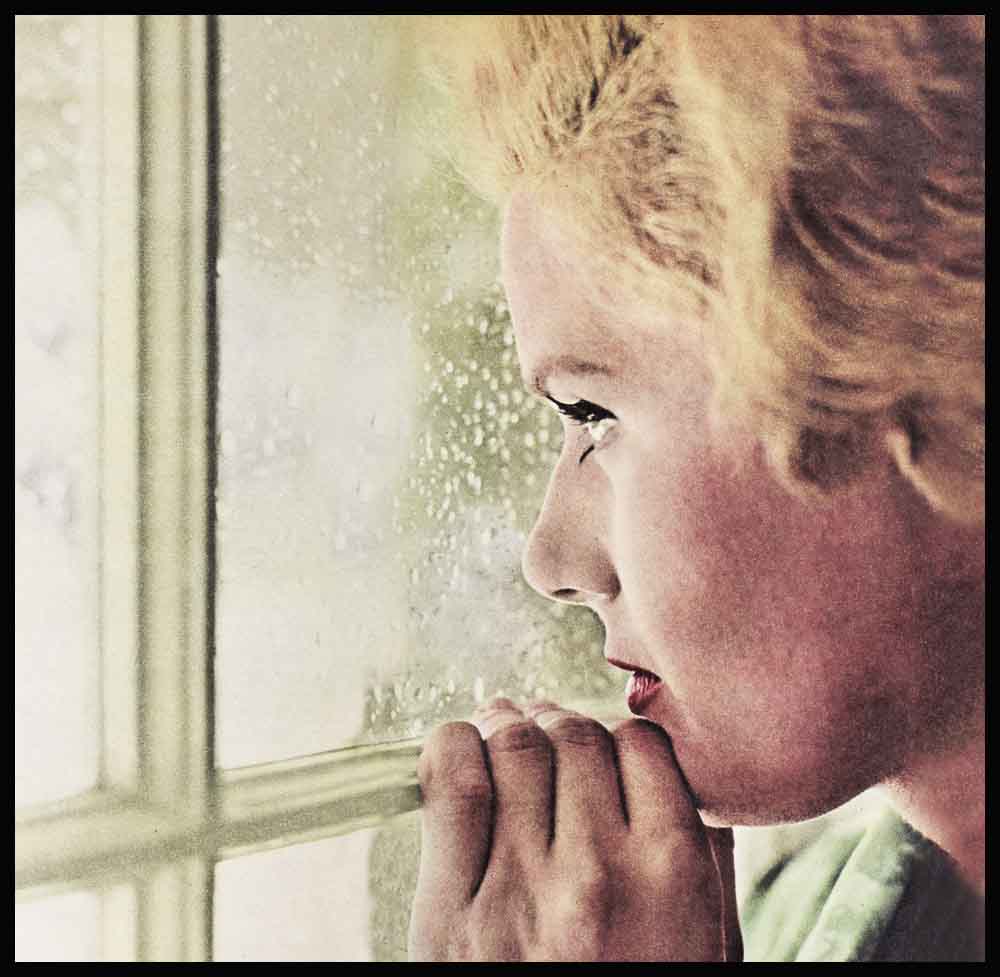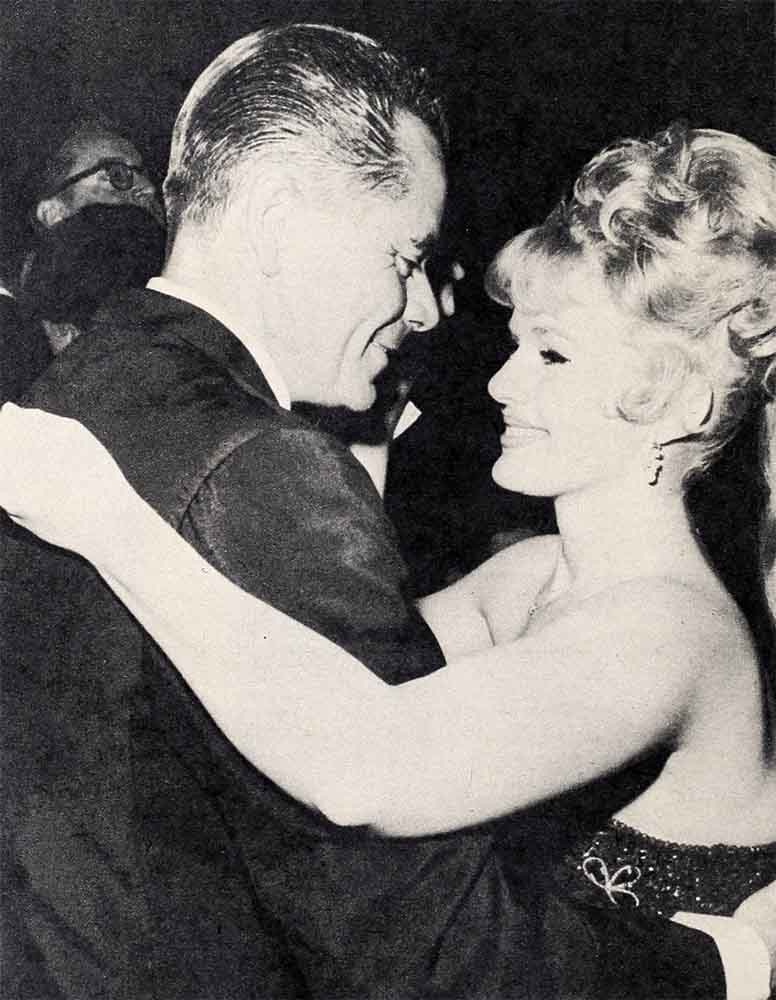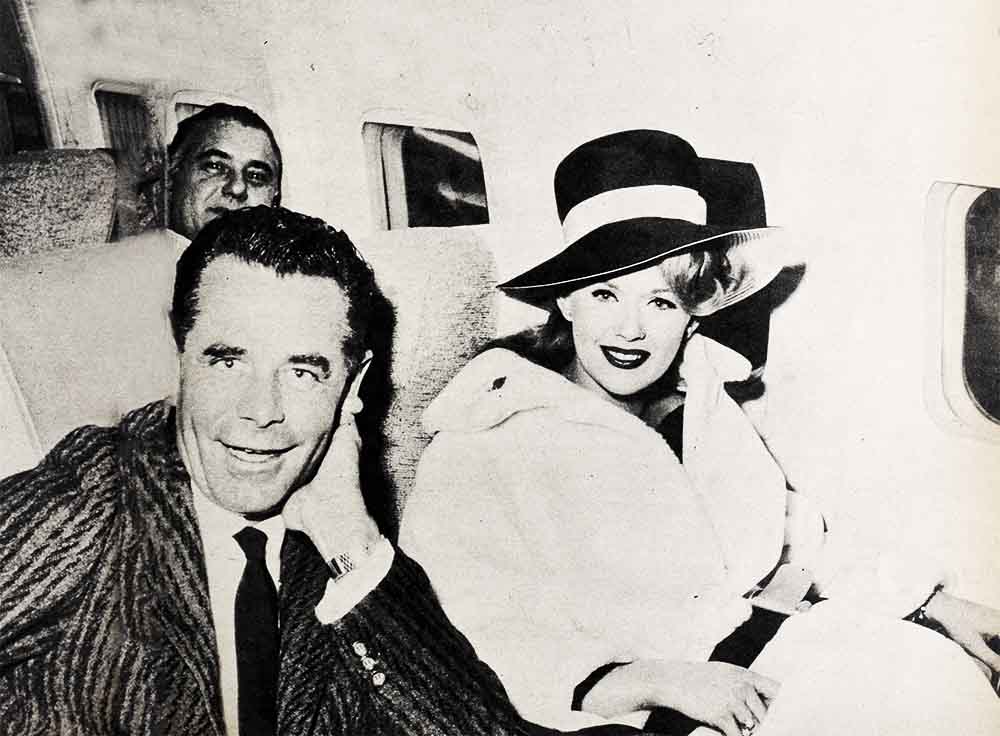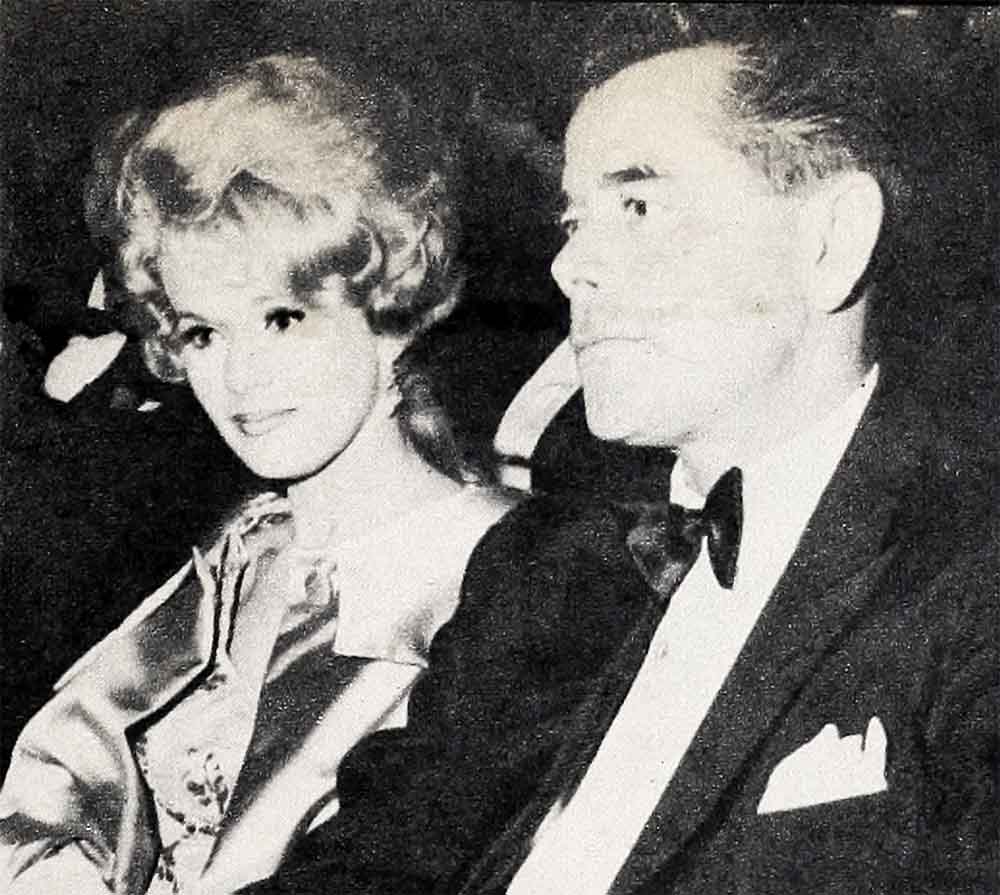
Connie Stevens—The Girl Who Is Almost Happy
It is the premiere of “The Four Horsemen of the Apocalypse’’—the world premiere, at the Ambassadeurs in Paris . . . a night sky fuming with fingers of light . . . the Champs Elysees crowded with the elite from all over the world . . . the throb of music . . . a dozen announcers excitedly broadcasting in a dozen different languages . . . television cameras grinding . . . the press pushing forward—top reporters from Madrid, Berlin, Rome, London, Barcelona . . . questions shouted to members of the French Cabinet . . . DeGaulle expected. . . .
AUDIO BOOK
Suddenly the attention shifts to the arriving star of the picture—to Glenn Ford. “The quiet American,” they call him in Paris and, “le cowboy celebre.” And they predict his performance will go down in history with that of Rudolph Valentino. Glenn is elegant tonight in full evening dress—lean, hard, his face wreathed in smiles. Because on his arm is Connie Stevens. A cheer goes up because she is so lovely in her white satin evening coat—thirty-eight yards around at the hem— with its black mink collar. Everything is lovely—her tiny black beaded shoes and bag, her black chiffon evening dress glimpsed briefly as the satin coat swirls about her. The two of them smile, they bow, they are literally carried into the theater on a wave of feeling.
But the best is later. After the premiere, after all the fervor and the plaudits and the party at Maxims. The best is much, much later as they stroll along the Left Bank of the Seine. It is a crisp black velvet night, the stars glittering as through a veil, and down near the river lovers twine together, leaning against the wall, clasped in each other’s arms, close and warm—oblivious.
Glenn loves Paris and he walks Paris. He roams through the night like an eager school boy, drinking in the sight, sound, taste, tone of Paris. “It has a flavor all its own,” he tells Connie. They pass the Auberge du Notre Dame, now locked and bolted for the night. He says, “We will come here tomorrow for dinner. It’s a tiny restaurant—look through the window, Dear, one wall is all little pottery bowls. They sit you down to a basket of sausages and French bread, mussels and then”—he draws a great breath as if scenting the meal—“a fine roast chicken, and for dessert, cream puffs smothered in a thick bot chocolate sauce.”
“When we get home I’ll go on a diet,” Connie giggles. “I’ll lose ten pounds and you’ll think I’m the most beautiful woman in the world.”
So far as he’s concerned she is the most beautiful in the world, and he loves to dine with her, watch her savor good food. Site has an enthusiasm and verve that’s contagious. They’ll go to the Crazy Horse and to Taivellent “where you’ve never tasted such souffles . . . little individual cheese, souffle appetizers. And for dessert, a Grand Marnier.”
Connie says that when they come home she is going to make a souffle for dinner and invite him. She loves to cook and she’s a good one. The first date they ever had, when Glenn took her to one of the finest restaurants in town for the best lasagna she’d ever eaten, Connie charmed him with her honesty. She just laughed and told him honestly, “Glenn, don’t be silly, I can make better lasagna than this!”
Arm in arm, close together through the tender Paris night, the sky growing lighter every minute, Connie hears how Glenn, on his first visit to France, climbed 14,000 feet up Mount Blanc, astonished the French—an actor to climb so?—and was decorated by the Syndicate du Guide.
Now it is almost dawn as they reach Les Halles, the great market of Paris, where the air is redolent of celery, chives and roses. At Le Pied du Cochon they have onion soup with a thick crust of cheese. Glenn fills Connie’s arms with roses and they stroll back leisurely to the George V.
“Onion soup and roses,” she laughs.
He laughs too. “Anything can happen in Paris.”
And tomorrow they will have lunch at Tour D’Argent. Glenn is so carefree it’s hard to remember he was once part of the French Resistance, and life was so different. Like Julio, Connie says, thrilled about Glenn’s performance. He confides that some of Julio—the dashing bon vivant with a lust for life—has indeed rubbed off on him, as all parts do.
Connie and Glenn are so gay together, Their romance started one day when Glenn phoned her on the set of “Hawaiian Eye” No—it actually started a week before that in New York, when Glenn bumped into her on the street and didn’t even know who she was. She and her cousin, Carol, had been walking on Fifth Avenue.
“Isn’t that Glenn Ford?” Carol asked and Connie’d said. “Where? Show me.”
“Right here, coming straight toward. . .”
“Excuse me,” Glenn said, jostling Connie’s elbow as she stopped short. He bowed slightly and continued on in that dignified way of his, his eyes looking far off as if he were at sea.
“Well, wasn’t it?” Carol persisted.
“Oh yes, it really was,” Connie said, “he’s on another sphere.”
A week later he was phoning her, and asking, “How about going to dinner some night?” Oddly enough, she’d expected this. Director Delmer Daves, who has worked with them both, had insisted that “the two most honest people in the world” should meet.
So on the phone Connie said honestly, “Why not tonight?”
Then she was terrified. He really was on another sphere, a great actor, a much-traveled, knowledgeable man—and what in the world would she talk about? She tried to remember all the things that Delmer Daves had told her. That inside this moody Welshman lived a volatile, eager boy. Few people really knew him—life and women had hurt him, he was inclined to be on guard.
“And how about me?” Connie had asked. Daves just shook his head. “You have never hurt anyone in your life, Connie. You’re open, you’re honest, you’re a giver. People have been taking from this man for years. You’ll be a revelation to him.”
Glenn drove over to call for Connnie with a few misgivings of his own. She was pretty young. He’d never met her. True, he’d seen “Parrish” and “Susan Slade,” the girl was a fine actress, but he’d never in his life gone out with a girl he didn’t know.
“You bumped into me on the street a week ago,” she told him.
“You’re kidding.”
“I’m not, it was on Fifth Avenue.” She led him into the high-ceilinged new house through which, at the pointed peaks, you can see the sky. She introduced him to her father—a warm, sensitive and poised man—and they liked each other at once. Long before they arrived at LaRue’s, Connie and Glenn were chatting like old friends.
“He opened a whole new world to me,” Connie told me a week or so later when we had lunch in her dressing room. “He is a brilliant man, he’s informed about everything. We talk about acting, for example, and it’s something to dream of. He has so many and such varied interests!”
They’ve never stopped talking. They dined at LaScala and at 2 A.M. The management sighed—please, the restaurant must close, would the signor and signorina return again soon? . . . They closed the Traders. . . . At the Starlight Roof the band played an extra half hour for them alone.
Last Christmas Connie invited Glenn to the house and he met her relatives by the dozens. It was his happiest Christmas since he was a boy surrounded by his father’s kin at Portneuf, the family home in Quebec. Gwyllyn Samuel Newton Ford he was then. His dad had been one of twelve children. That’s why he’d been named Gwyllyn, all the other names had been used up. When they sat down to dinner there were twenty at his grandma’s table.
Now at Connie’s he loved the warm ways of a huge Italian family, from the grandfather down to the last cousin. He got into a poker game—not a man’s straight five card stud and draw, but a weird switch that Connie dreamed up: “One-eyed-Jacks- and-no-peak. “Strictly a dame’s invention. But,” he admits, “I liked it.”
That night he went with them to late candlelight service at the church down on Hoover Street.
Beginnings are so exciting. Friendship or love—who ever knows what this new relationship will be? But beginnings are two people trying to tell each other everything that’s ever happened to them, trying to explain who they are, seeing their own joy reflected in the faces of others. Connie’s relatives . . . Connie’s friends . . . Glenn’s friends . . . all are glad for them. People smile when they enter a room. At a recent party, actor Louis Quinn came up to Connie.
“Honey,” he said, “this guy Glenn is a good friend of mine. I love him. And he’s had a rough go. What about this, now? You on the level with him?”
“I like him very, very much,” Connie said softly. “I respect him with all my heart. He’s opened a whole new world to me!”
Louis took a deep look into her fresh, open sparkling face.
“Okay, honey,” he said. “That’ll do.”
Glenn is touched because she’s been so touchingly concerned—for him—about the gossip columns. “Hottest romance in town.” She’s hated to see him involved. He’s above that, she says. And he says, “It’s the first time in my life anyone ever tried to protect me.” It was a good try.
At the Crescendo, heckler Don Rickles didn’t even heckle them. “For the first time in my life,” he said, “I could think of nothing insulting to say.”
At Joe Steffano’s Twelfth Night Party, all Glenn’s friends fell in love with Connie. And on the set of “Hawaiian Eye,” Bob Conrad et al took a vote and reported, “We hereby approve of your current escort.” Tommy Shaw, the prop man who watches over Connie like a guardian angel, who throws most would-be admirers off the set, welcomed Glenn with open arms.
They’ve rubbed off a bit on each other. Which isn’t strange, despite the difference in their backgrounds. Connie is exuberance itself; and Glenn is a man who’s been cautious, who’s taken his dates to inconspicuous places, everything sotto voce. But not now. Now he’s taken Connie to Paris!
Here’s how that came about. One day Glenn phoned her on the set.
“How about dinner and a movie on the seventeenth?” he said.
“Wonderful!” She laughed her flutey little laugh, because Glenn was taking her to dinner that very night and dating her for the seventeenth was just one of his humorous touches. Just as hers is a trick of double-talking in a made-up language for the benefit of eavesdroppers at nearby tables.
A few nights later, about to twist at the Starlight Roof, he took her hand.
“About that dinner and movie on the seventeenth,” he said. “Dinner will be at Maxims and the movie will be ‘The Four Horsemen’ at the Ambassadeur on the Champs Elysees.”
There wasn’t a moment’s hesitation.
“Great!” Her eyes were dancing. “When do we leave?”
Glenn says Connie is that rare girl who makes up her mind without flirtatious hems and haws because she was brought up by men. She was surrounded by candor and directness and given the ability to stand on her own two feet and make her own decisions. Her father has great faith in her and always has had.
But when Glenn said “Paris” and Connie said “Fine!”—there was one small hitch. Glenn’s studio, M-G-M, put in an official request to Connie’s studio, Warner Brothers, that she attend this dazzling world premiere. A week passed—and there was no word. Glenn was worried. Suppose it couldn’t be arranged. . . .
“Look,” Connie said. ‘I’ll go. I said I’d go and I will.”
She meant it, you could tell. Even if she took a suspension. Fortunately, she didn’t have to. The studio finally said yes, and merely stipulated that she make some personal appearances in New York for “Susan Slade.” She had two days free for that while Glenn was tied up with his own business conferences in New York.
Then, early on a Sunday morning, off they flew for Paris. Connie had on a stunning beige suit-dress and a very pretty hat. It was a far cry from the last outfit she’d worn out of New York—the day a group of us met her in Ontario, California, because the Los Angeles airport was fogged in. A number of celebrities came off that plane—John Raitt, Paula Prentiss, etc.
After them came Connie—resplendent in her white sports coat, black pants, white sneakers, a kerchief on her hair, a black velvet hat with a rose perched atop the kerchief—because her hands were full. She was carrying her mink coat, two cheese cakes and a pan of lasagna.
No sneakers traveling with Glenn, and no lasagna. She looked lovely, and Glen told her so. She’d worn a different outfit every night since they met, he’d never seen her in the same one twice, and each one he insists is “more exquisite.”
He, of course. looked as suave as if Julio had just stepped off the screen—as if he were quite accustomed to whisking dates off to any part of the world on a moment’s notice. Which, as you know perfectly well, he does not. Until a couple of years ago, Glenn lived in a sort of self-imposed straitjacket from which the close observer felt some day he’d have to explode. Well, he exploded. But even then he proved circumspect, publicity-shy so far as his private life is concerned, never really free, not even in his dancing. There was always something con- strained about Glenn.
Well, last seen, he was drinking onion soup at Le Pied du Cochon (The Foot of the Pig), filling Connie’s arms with roses and walking through his beloved streets of Paris—and there was nothing in the least constrained about him. He was having fun. So was she. That’s why they were there . . . to prolong this exciting beginning.
“Some day,” Connie tells him, “you’re going to find I have faults!”
“Okay,” Glenn tells her. “Some day you re going to find I have.”
But not now. Not yet. This is fun, this is the most glamorous date either of them ever had in their lives. This is a thrilling, romantic first for the girl who has been almost—but never completely—happy with any man before Glenn. And this is the experience of a lifetime for the man who many feel has never been really happy with any woman before Connie.
Six months ago, speaking nostalgically of Paris, Glenn told me, “Some day I’ll visit it with someone who’ll make it a sentimental city for me.”
Connie did exactly that for him.
But there are those who know the two of them so well that they ask, “For how long?” They’re positive it can’t last. Glenn may seem to be the man Connie has searched for all her life—but in actuality he’s only showing this exuberant girl the other side of herself—of the girl who is almost happy in love.
—JANE ARDMORE
Connie’s in Warners’ “Susan Slade,” and in “Hawaiian Eye,” ABC-TV, Wednesday, 9:30 P.M. EST. Glenn is in M-G-M’s “Four Horsemen of the Apocalypse.”
It is a quote. PHOTOPLAY MAGAZINE APRIL 1962
AUDIO BOOK







